May 23, 2025 | 10:24 GMT +7
May 23, 2025 | 10:24 GMT +7
Hotline: 0913.378.918
May 23, 2025 | 10:24 GMT +7
Hotline: 0913.378.918
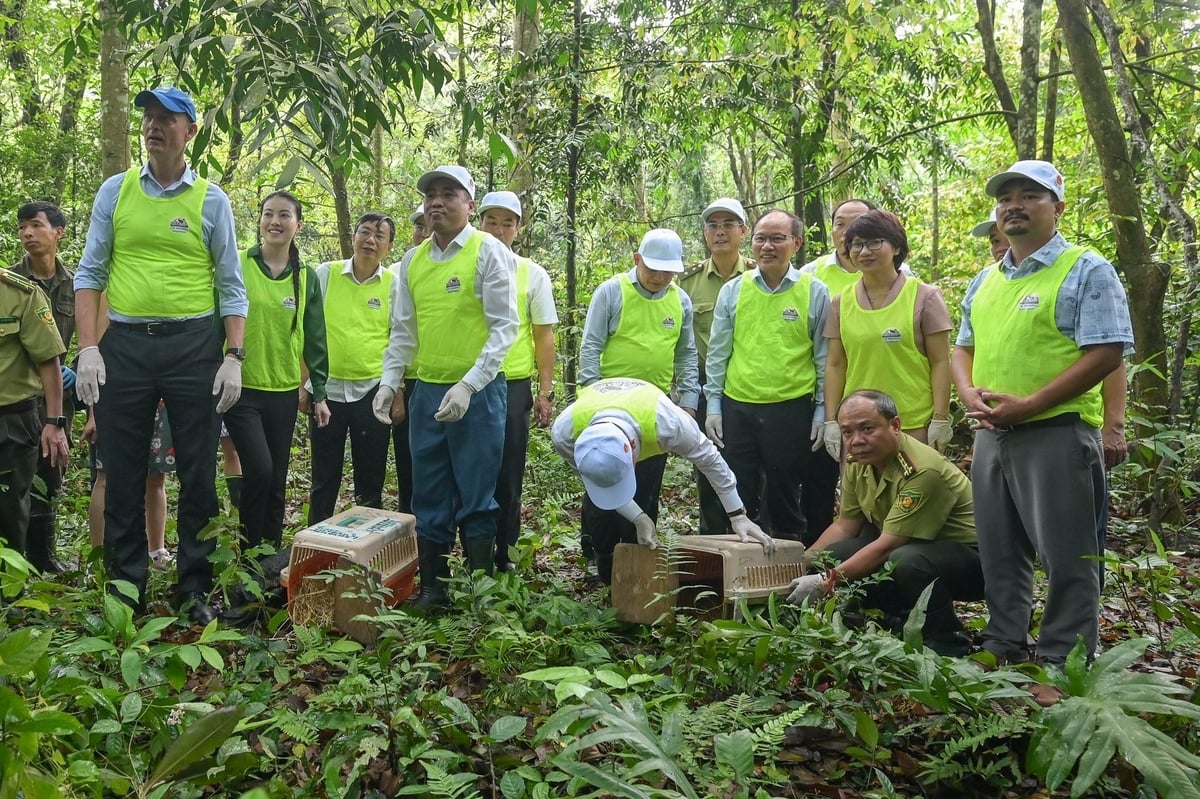
Deputy Minister Nguyen Quoc Tri, along with representatives from UNDP and the Ninh Binh Provincial People's Committee, participated in animal reintroduction activities at Cuc Phuong National Park, commemorating International Day for Biological Diversity. Photo: Tung Dinh.
On the morning of May 22, the Ministry of Agriculture and Environment, in coordination with the Ninh Binh Provincial People's Committee, the United Nations Development Programme (UNDP), and the German Agency for International Cooperation (GIZ) GmbH, organized the celebration of International Day for Biological Diversity 2025 with the theme "Living in harmony with nature and sustainable development”.
Vietnam is a country with high biodiversity, ranking 16th globally, boasting numerous endangered, rare, and precious species, as well as valuable wild genetic resources of national and international importance. The system of nature reserves has been continuously expanded and strengthened with 178 protected areas distributed widely across the country, including special-use forests, marine and wetland protected areas. Many of these areas have received international recognition for their importance, including 9 wetlands of international importance (Ramsar sites), 11 world biosphere reserves, and 12 ASEAN Heritage Parks. Species and genetic resource conservation programs have also been prioritized and have achieved many successes.
However, nature and biodiversity conservation are facing significant pressure from economic development, climate change, environmental pollution, forest degradation, and the invasion of alien species. These losses will be irreversible if we do not act promptly and decisively, leveraging the strength of the entire society.
Opening the event, Deputy Minister of Agriculture and Environment Nguyen Quoc Tri affirmed that International Day for Biological Diversity is the appropriate time to foster national pride and responsibility, as Vietnam is one of the countries with high biodiversity and an active, responsible member of the international community, striving to conserve nature and biodiversity.
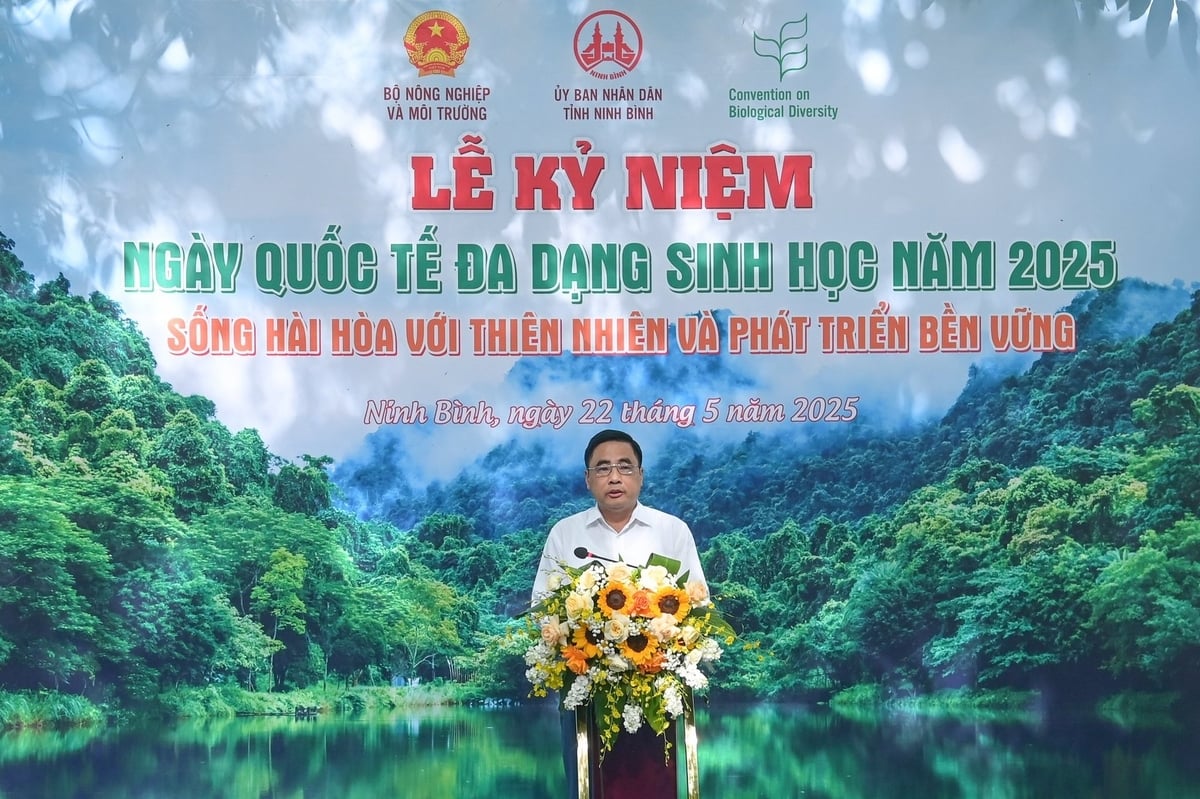
Deputy Minister of Agriculture and Environment Nguyen Quoc Tri delivered the opening speech at the event. Photo: Tung Dinh.
In this endeavor, the Deputy Minister called on ministries, sectors, central agencies, local authorities, organizations, and individuals to take practical actions to address nature and biodiversity conservation. These actions should focus on: continuing to improve mechanisms and policies towards a harmonious combination of conservation with rational exploitation and utilization of biodiversity; effectively implementing the national biodiversity strategy aiming for restoration and ensuring integrity and connectivity; promoting the application of science-technology and digital transformation; mobilizing financial resources and diversifying investments for biodiversity; and strengthening communication, education, and raising community awareness about nature and biodiversity conservation.

Mr. Nguyen Cao Son, Vice Chairman of the Ninh Binh Provincial People's Committee, stated that the province clearly identifies environmental protection and biodiversity conservation as prerequisites for promoting the development of key economic sectors. Photo: Tung Dinh.
Mr. Nguyen Cao Son, Vice Chairman of the Ninh Binh Provincial People's Committee, shared that as a locality with abundant and diverse natural resources, Ninh Binh province clearly identifies environmental protection and biodiversity conservation as prerequisite conditions for promoting the development of key economic sectors.
According to the Ninh Binh Provincial People's Committee leader, in the coming period, the province will intensify the integration of biodiversity conservation goals into socio-economic development strategies at all levels and sectors. Concurrently, it will prioritize investment in projects to protect natural landscapes, restore degraded ecosystems, and support local communities' participation in conservation through sustainable livelihood models.
Specifically, the province will continue to promote the role of special protected areas such as Cuc Phuong National Park, Van Long Wetland Nature Reserve, and the Trang An Scenic Landscape Complex in conserving rare animal and plant species, while also serving as a bridge between scientific education, tourism, and the community.
From the co-organizer's side, Mr. Patrick Haverman, Deputy Resident Representative of UNDP Vietnam, stated that by building clear legal and policy frameworks, the government can create the necessary conditions for sustainable financial mechanisms to be established, applied, and developed. Alongside this, the private sector plays a crucial role in practicing sustainable principles (ESG), ensuring that investments not only generate financial returns but also deliver measurable environmental and social benefits.
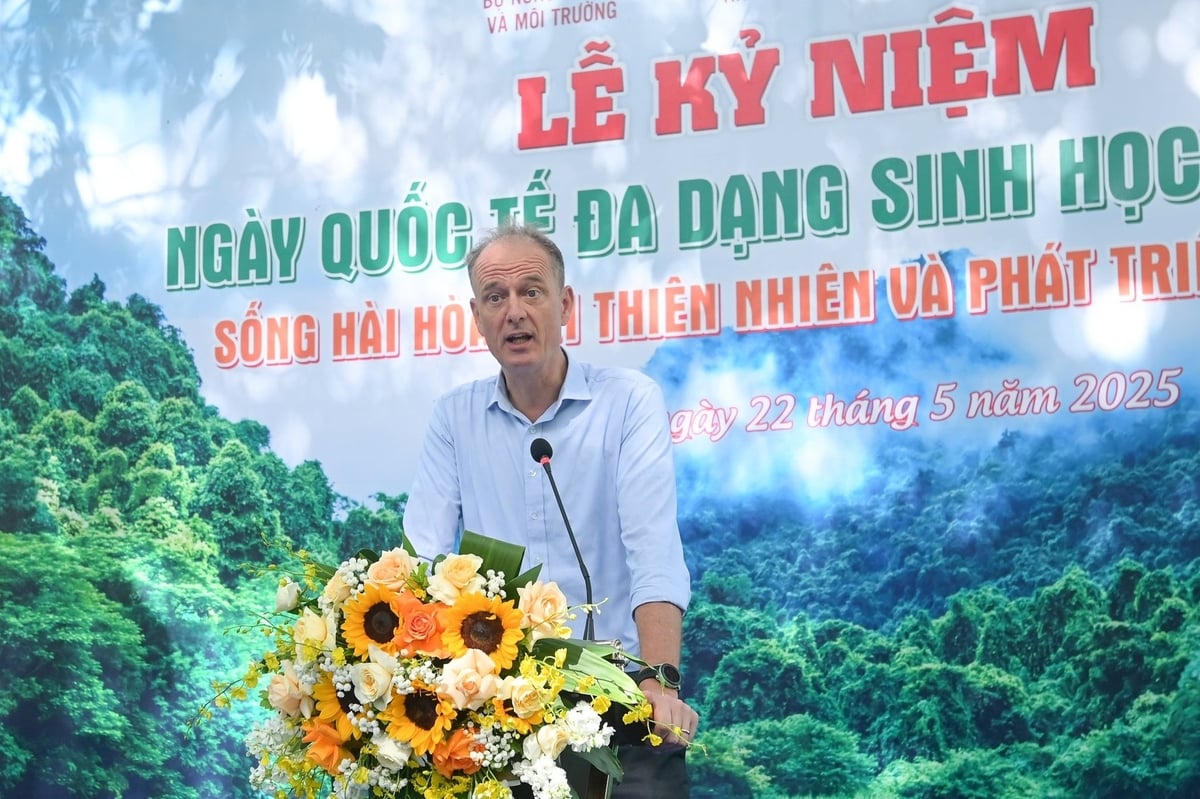
Mr. Patrick Haverman, Deputy Resident Representative of UNDP Vietnam, pledged to continue supporting Vietnam in creating a real impact on biodiversity conservation. Photo: Tung Dinh.
He also emphasized the importance of local communities, especially women, children, and ethnic minorities, noting that they are not only the most affected by biodiversity loss but can also be effective managers of these resources.
"UNDP will continue to support Vietnam on this journey, through policy advice, technical assistance, and leveraging partnerships to bring about real impacts," Mr. Patrick affirmed.
Global Biodiversity Framework and Sustainable Development
The Kunming-Montreal Global Biodiversity Framework, adopted in December 2022 at the 15th Conference of the Parties to the Convention on Biological Diversity, includes 23 targets, demonstrating a commitment to halting biodiversity degradation and restoring nature for the sustainable development of the planet.
International Day for Biological Diversity 2025, launched by the United Nations with the theme "Living in harmony with nature and sustainable development," aims to emphasize the close link between biodiversity and human well-being. It also affirms that achieving the Sustainable Development Goals (SDGs) depends on a healthy and thriving natural world. Through this theme, the United Nations calls on countries to simultaneously implement the goals of the Kunming-Montreal Global Biodiversity Framework and the 2030 Agenda for Sustainable Development to protect planet Earth and the future of humanity.
Translated by Linh Linh

(VAN) Dr. Hoang Thi Thanh Nhan – Deputy Director of the Nature and Biodiversity Conservation Agency – highlighted this on the International Day for Biological Diversity, May 22, 2025.
![Ho Chi Minh city adapts to climate change: [2] Accelerating action](https://t.ex-cdn.com/nongnghiepmoitruong.vn/608w/files/chiqk/2025/05/22/4024-4220-bien-doi-khi-hau-1-100626_766.jpg)
(VAN) Clearly recognizing the challenges posed by climate change, Ho Chi Minh city has swiftly shaped its policies and implemented practical solutions to adapt.

(VAN) Rice straw is no longer just a discarded byproduct, but it is becoming a green resource that helps farmers in the Mekong Delta reduce emissions and promote circular, sustainable agriculture.

(VAN) Other Effective Area-based Conservation Measures (OECMs) are solutions that contribute effectively to achieving the goals of the Kunming–Montreal Global Biodiversity Framework.
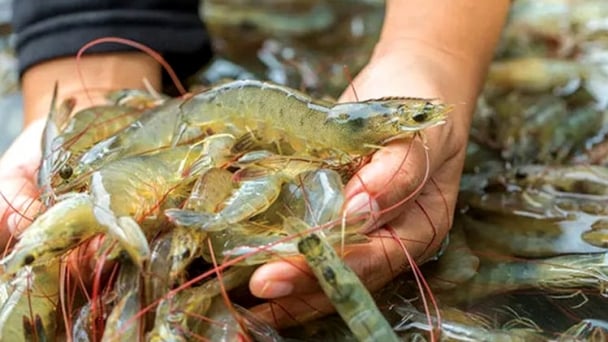
(VAN) A study assessing the carbon footprint of whiteleg shrimp farming in China shows the potential for carbon emission reduction through the use of renewable energy.
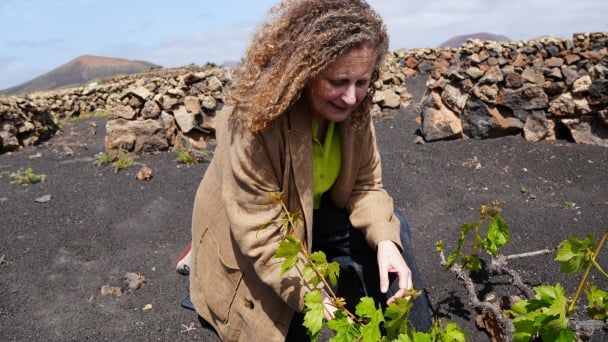
(VAN) Brazil, China, Mexico and Spain receive new designations of Globally Important Agricultural Heritage Systems from FAO.